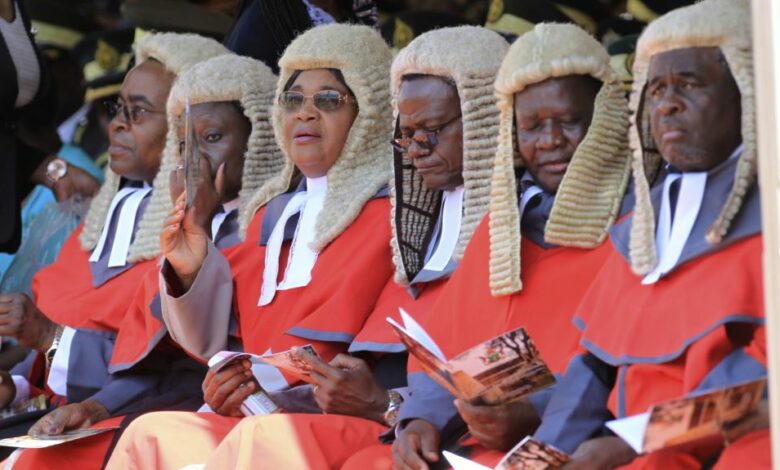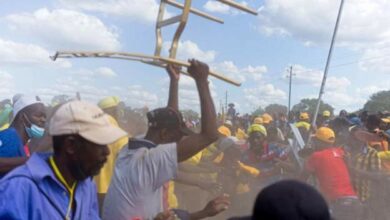
Although not every judge subscribes to influence, certain cases demonstrate the courts in Zimbabwe are more lenient to Zanu PF, with analysts warning that if judicial capture is not curtailed, people may be enraged by judgments, which can lead to organised violence,
Discussing whether Zimbabwe’s judiciary is captured in relation to the Electoral Act and the Constitution, and if it can lead to organised violence, political analyst Effie Ncube said judiciary independence must be considered from two perspectives: institutionally and individually.
“Institutional judicial independence and separation of powers is contemplated in Section 164 and 165 of the Constitution but that is not enough. You need to go beyond and look into the independence of individual judges,” Ncube said at the Bulawayo Media Centre last Thursday.
“A state and institutions cannot be more democratic than the people running it, so the people that are in it matter outside the framework we are talking about.”
According to Ncube, when looking at specific cases, on a case-by-case basis, one begins to recognise there is an issue with ‘our’ judiciary.
“Judicial capture must not be understood only as being limited to being captured by the legislature or the executive. Judiciary can actually be captured by any political ideology where they then see themselves as an extension of the political ideology,” said the analyst.
Ncube said that a judiciary can be controlled by a society’s political culture, a culture of impunity and lawlessness in which judges are co-opted into a system in which laws are selectively enforced.
“Certain people are excluded from punishment, even if that punishment is due. Certain sentences are heavier than others depending on the political affiliation of the people. So, there is no doubt in my mind when you look at some of our judges, you don’t need to capture an entire institution to achieve judicial capture” he said.
“You do not need to necessarily capture the Chief Justice, the whole Constitutional Court and the entire entourage of the Supreme Court to the High Court for you to have achieved judicial capture. You need only to identify certain people, certain cases and influence them to get certain outcomes.”
As a result, Ncube argued “there is sufficient judicial capture in this country. It might not be every judge subscribing to that capture, but there are certain cases that demonstrate this.”
He added that when it comes to the ruling party, there is more leniency and subservience when judges are deciding cases.
“When talking about judiciary capture, we also have to take into account the public perception of the community, the Zimbabweans that are supposed to be saved by the judiciary. Do they, regardless of their political affiliation, feel the judges are independent enough, that they limit themselves only to the law and facts of the case? That they are not influenced by any other things out there? I would argue they don’t,” Ncube said.
“If you are in the opposition, you believe the law is skewed against you. You believe judges are not going to handle your case in the same way they would handle a case where the litigant is a Zanu PF member. Perception matters because justice must not just be done, but it must be seen to be to be done.”
Ncube explained that seeing was emphasized because courts do not have soldiers or police to enforce their orders but depend on legitimacy and acceptance of their judgments by people.
“When you look at cases before the courts, our judges and magistrates have a tendency to be more lenient when there is involvement of the ruling party. That is the reason why when a member of Zanu PF is arrested they are actually surprised even if they are found breaking the law,” Ncube said.
“There is a sense of entitlement because Zanu PF doesn’t only believe the police are supposed to be part and parcel of the ruling party but also believe the judiciary is necessarily an extension of them. So you will see them wanting to obstruct the police from doing their work because they say, ‘we are right.’”
According to Ncube, weak courts might lead to organised violence since they do not play role in preventing it.
“The judiciary has not come hard on organised crime, torture and other things we see out there. Had the judiciary been tough, we were going to get a very different outcome from what we are having. When you look at the political culture that has been created since 1980-a culture of lawlessness, the conflation of the State and the ruling party, you can see opposition activists are handled differently from the way ruling party activists are handled. That to me constitutes judicial capture.”
Ncube said any measure of taint on the judiciary negatively affected its reputation.
“A judiciary is supposed to be like your pure white milk. If you have a bucket of 200 litres of clean water and you bring just a small bottle of sewer water and you pour it in and ask people to drink, can you make an argument that the dirt is not big enough but was supposed to be 50 litres or more to taint that?”
The analyst said more has to be done to free the judiciary from capture.
“We must not limit ourselves to saying, if the judiciary is not under the control of the Executive or the legislature, then it is not captured. It can actually be captured by the ruling party Zanu PF. It can actually be captured by the police, prosecution or whatever influence is there,” he said, adding “it is very difficult to find real people in the opposition circles who will believe that if a matter of this elections were to spill over to the Constitutional Court, the judges are sufficiently independent, impartial and objective to render a judgment they are comfortable with.”
To avoid violence from breaking out after elections Ncube said Zimbabwe needs an independent judiciary to counterbalance the Executive.
“If you ask yourself to what extent our judiciary has been countering the abuse of power in organised violence in this country, you can hardly find any cases where you can point to make unpalatable judgements for the Executive,” Ncube said.
Although not every judge was subject to undue influence Ncube said capture has been in key matters.
“If you look at Gukurahundi, the judiciary actually failed the people during the genocide, but it failed people more after people asked for Dumbuchena and Chihambakwe reports. The courts said the litigants did not demonstrate sufficient basis to warrant that they should receive or see what is there. Thousands of people are alleged to have been killed and the courts find nothing wrong with that,” he remarked.
“I cannot explain it in any other way, except to say some judges are captured, if not by the executive, then by the political culture and ideologies that are flying around and also by the culture of lawlessness and impunity.”
Advocate Kucaca Phulu said there was not enough evidence to say the judiciary was captured but conceded there is “judicial interference” that affected the courts.
“At this stage it is still too early in my view to conclude. There are a number of challenges and there are a number of things we need to fix to strengthen and enhance the independence of the judiciary. But I think it is too early for us to conclude that the judiciary is captured. Because to achieve a state of capture is not easy, it’s difficult for you to allege that the judiciary is captured needs for you to have actual evidence,” he said.






